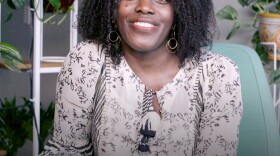Rachel Faulkner White
Rachel Faulkner is a producer and editor for TED Radio Hour.
During her time at NPR, Faulkner has also helped create dozens of TED Radio Hour segments, including a long-form interview on navigating grief and hardship, a look at how family income affects childhood brain development, a conversation on loneliness and human connection and an exploration of outer space and gravitational waves. She also occasionally produces episodes of How I Built This, including fan favorites like The McBride Sisters, Rent The Runway, Bumble and filmmaker Ava DuVernay.
Faulkner is part of the TED Radio Hour team that received a 2018 Webby Award for their Manipulation episode. She also worked as a research assistant for Professor Steven V. Roberts, author of the memoir Cokie: A Life Well-Lived, about his wife (and one of NPR's Founding Mothers) Cokie Roberts.
Faulkner joined NPR in 2016 as an intern. She started producing while finishing college, coming into the office between classes, and joined NPR full-time after finishing her bachelor's degree in journalism and mass communications from George Washington University.
-
mRNA vaccines are groundbreaking—but the mRNA inside them is fragile. Kathryn Whitehead explains how scientists have created the right "packing material" to safely deliver these to the right cells.
-
Norwegian social worker Knut Ivar Bjørlykhaug always loved nature. Watching the destruction of habitats and Norway's exploitation of oil sent him into a deep depression. But he has since found hope.
-
For pediatric critical care nurses, tragedies are part of the job. But so much loss can wear on you. Nurse Hui-wen Sato describes how she found her way--through the life-giving lessons of grief.
-
Cardiologist Sandeep Jauhar explains a case where deep grief caused takotsubo cardiomyopathy—also called "broken heart syndrome." He examines the connection emotions have with our most vital organ.
-
The loss of Native American food traditions has been taking place for centuries. At Owamni, chef Sean Sherman is trying to change that by serving food that celebrates and preserves Lakota cooking.
-
Beauty is in the eye of the beholder. But it's also shaped by global norms. This hour, journalist Elise Hu reflects on what's considered beautiful now, and how we'll think about beauty in the future.
-
Cone snails are deadly sea predators; their venom can kill fish and even humans. But chemical biologist Mandë Holford says that powerful venom can actually be used for good — to treat human diseases.
-
An ear made from an apple, a spinal cord rebuilt using asparagus...it sounds like bizarre science fiction. But Andrew Pelling is working on a way to revive human tissue with a trip to the supermarket.
-
At birth, babies' brains look pretty similar. But by age five, there are acute disparities in development. Through a series of studies, Kimberly Noble has found one major factor is family income.
-
As a deaf person, Rebecca Knill is anti-noise and "neutral" on sound. She explains how technology allows her to hear what she wants to hear, and asks why our mindset about ability hasn't caught up.







